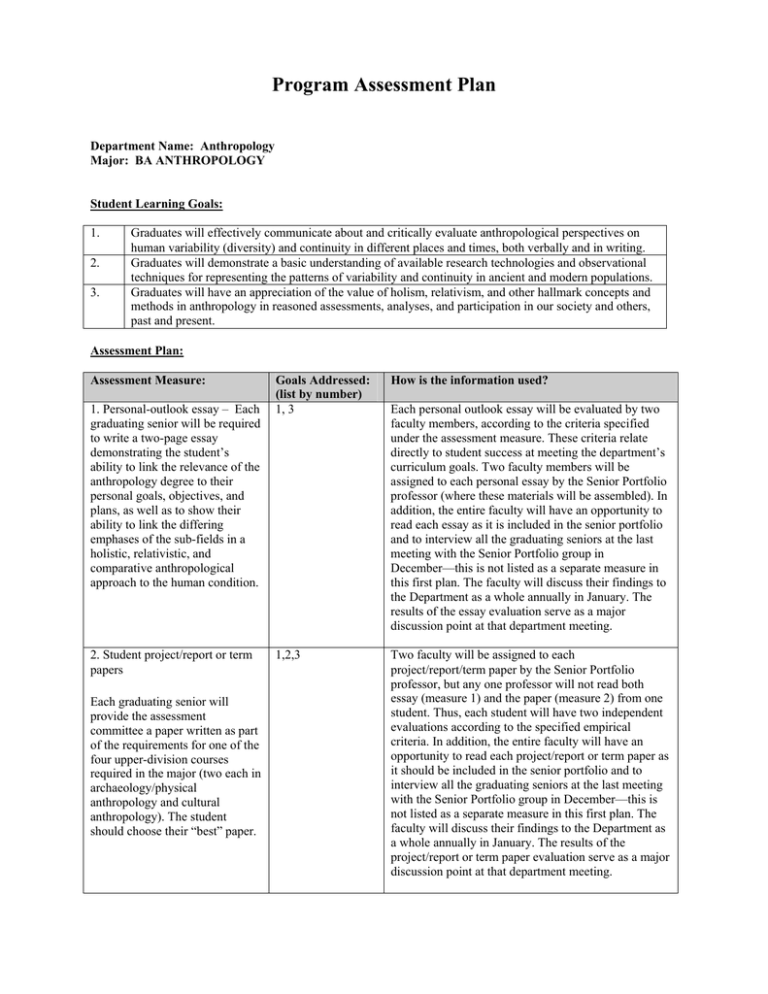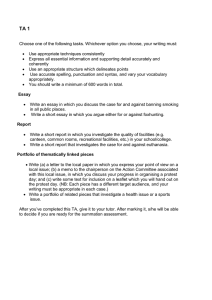Program Assessment Plan
advertisement

Program Assessment Plan Department Name: Anthropology Major: BA ANTHROPOLOGY Student Learning Goals: 1. 2. 3. Graduates will effectively communicate about and critically evaluate anthropological perspectives on human variability (diversity) and continuity in different places and times, both verbally and in writing. Graduates will demonstrate a basic understanding of available research technologies and observational techniques for representing the patterns of variability and continuity in ancient and modern populations. Graduates will have an appreciation of the value of holism, relativism, and other hallmark concepts and methods in anthropology in reasoned assessments, analyses, and participation in our society and others, past and present. Assessment Plan: Assessment Measure: 1. Personal-outlook essay – Each graduating senior will be required to write a two-page essay demonstrating the student’s ability to link the relevance of the anthropology degree to their personal goals, objectives, and plans, as well as to show their ability to link the differing emphases of the sub-fields in a holistic, relativistic, and comparative anthropological approach to the human condition. 2. Student project/report or term papers Each graduating senior will provide the assessment committee a paper written as part of the requirements for one of the four upper-division courses required in the major (two each in archaeology/physical anthropology and cultural anthropology). The student should choose their “best” paper. Goals Addressed: (list by number) 1, 3 1,2,3 How is the information used? Each personal outlook essay will be evaluated by two faculty members, according to the criteria specified under the assessment measure. These criteria relate directly to student success at meeting the department’s curriculum goals. Two faculty members will be assigned to each personal essay by the Senior Portfolio professor (where these materials will be assembled). In addition, the entire faculty will have an opportunity to read each essay as it is included in the senior portfolio and to interview all the graduating seniors at the last meeting with the Senior Portfolio group in December—this is not listed as a separate measure in this first plan. The faculty will discuss their findings to the Department as a whole annually in January. The results of the essay evaluation serve as a major discussion point at that department meeting. Two faculty will be assigned to each project/report/term paper by the Senior Portfolio professor, but any one professor will not read both essay (measure 1) and the paper (measure 2) from one student. Thus, each student will have two independent evaluations according to the specified empirical criteria. In addition, the entire faculty will have an opportunity to read each project/report or term paper as it should be included in the senior portfolio and to interview all the graduating seniors at the last meeting with the Senior Portfolio group in December—this is not listed as a separate measure in this first plan. The faculty will discuss their findings to the Department as a whole annually in January. The results of the project/report or term paper evaluation serve as a major discussion point at that department meeting. Assessment Measure: Each paper will be scored for each of the following parameters by at least 2 faculty members: 1. Knowledge and understanding of current findings and conclusions in an anthropological subject area 2. Effective written communication and ability to think critically 3. Use of research technologies and methods 4. Comparison and contrast of patterns of continuity and variability (diversity) 5. Relevance of anthropological methods and theory to research and real-world problems Updated: February 20, 2008 Goals Addressed: (list by number) How is the information used? Depending on the record of student performance from year to year, the information could be used to determine whether any revisions in the major curriculum or assessment procedures are needed. Since this is the first year we are implementing the assessment report, the information will be used by the department for initial discussions of the structure of the curriculum and the assessment plan with regard to our standing goals. After the second year, comparisons will be made, discussions of revisions may become more serious, and the information and any actions we take will be reported in our 5-year department reviews.


